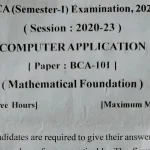SGBAU question papers typically consist of various sections, including multiple-choice questions (MCQs), short answer questions, long answer questions, and sometimes practical or lab-based questions. The weightage of these sections varies depending on the subject and course level.
Here Are Some Subject MCQ’s For SGBAU Question Paper
Computer Science
- Data Structures and Algorithms
- Q: Which of the following data structures is best suited for implementing a priority queue?
- A) Stack
- B) Queue
- C) Heap
- D) Linked List
- Q: What is the time complexity of searching for an element in a balanced binary search tree?
- A) O(1)
- B) O(n)
- C) O(log n)
- D) O(n log n)
- Q: Which of the following data structures is best suited for implementing a priority queue?
- Operating Systems
- Q: Which of the following is not a type of operating system?
- A) Batch Operating System
- B) Real-time Operating System
- C) Network Operating System
- D) Virtual Operating System
- Q: Which scheduling algorithm is non-preemptive?
- A) Round Robin
- B) First Come First Served (FCFS)
- C) Shortest Job First (SJF)
- D) Priority Scheduling
- Q: Which of the following is not a type of operating system?
Electronics and Telecommunication
- Analog Circuits
- Q: In a common-emitter amplifier, the output is:
- A) In phase with the input
- B) 90 degrees out of phase with the input
- C) 180 degrees out of phase with the input
- D) None of the above
- Q: The main function of a rectifier is to:
- A) Amplify the signal
- B) Convert AC to DC
- C) Invert the signal
- D) Filter the signal
- Q: In a common-emitter amplifier, the output is:
- Digital Electronics
- Q: A flip-flop is a:
- A) Combinational circuit
- B) Sequential circuit
- C) Both combinational and sequential circuit
- D) None of the above
- Q: The binary equivalent of the decimal number 10 is:
- A) 1010
- B) 1100
- C) 1001
- D) 1111
- Q: A flip-flop is a:
Mechanical Engineering
- Thermodynamics
- Q: The first law of thermodynamics is also known as:
- A) Law of conservation of mass
- B) Law of conservation of energy
- C) Law of conservation of momentum
- D) Law of conservation of angular momentum
- Q: Which of the following processes is an isochoric process?
- A) Constant pressure
- B) Constant volume
- C) Constant temperature
- D) Adiabatic
- Q: The first law of thermodynamics is also known as:
- Fluid Mechanics
- Q: Bernoulli’s equation is derived from the principle of conservation of:
- A) Mass
- B) Momentum
- C) Energy
- D) Force
- Q: In a laminar flow of fluid, the velocity distribution across the section is:
- A) Parabolic
- B) Linear
- C) Hyperbolic
- D) Exponential
- Q: Bernoulli’s equation is derived from the principle of conservation of:
Civil Engineering
- Structural Analysis
- Q: The point of contraflexure occurs in:
- A) Cantilever beams
- B) Simply supported beams
- C) Overhanging beams
- D) Fixed beams
- Q: In a truss, the member forces are determined using:
- A) Lami’s theorem
- B) Pythagorean theorem
- C) Method of joints
- D) Varignon’s theorem
- Q: The point of contraflexure occurs in:
- Geotechnical Engineering
- Q: The bearing capacity of soil is defined as:
- A) The maximum load that the soil can bear
- B) The minimum load that the soil can bear
- C) The average load that the soil can bear
- D) None of the above
- Q: The soil which contains high plasticity and high shrinkage property is:
- A) Sand
- B) Silt
- C) Clay
- D) Gravel
- Q: The bearing capacity of soil is defined as:
Download All SGBAU Question Papers
Sant Gadge Baba Amravati University (SGBAU) is a renowned university in Maharashtra, India, known for its diverse academic offerings and rigorous examination standards. This guide aims to provide comprehensive information about SGBAU question papers across various subjects and classes, helping students prepare effectively for their exams.
Overview of SGBAU
SGBAU, established in 1983, has a wide array of faculties, including Arts, Science, Commerce, Engineering, Technology, Medicine, and more. The university conducts examinations for undergraduate, postgraduate, diploma, and doctoral programs. Understanding the structure and type of question papers can significantly aid students in their academic journey.
Importance of SGBAU Question Papers
Question papers from previous years are invaluable resources for students. They help in understanding the exam pattern, types of questions asked, and the marking scheme. Analyzing these papers can enhance time management skills and boost confidence.
Structure of SGBAU Question Papers
SGBAU question papers typically consist of various sections, including multiple-choice questions (MCQs), short answer questions, long answer questions, and sometimes practical or lab-based questions. The weightage of these sections varies depending on the subject and course level.
Subjects and Classes
1. Faculty of Arts
Undergraduate Courses:
- English Literature: Focus on literary analysis, poetry, prose, and drama. Previous papers include critical essays and textual interpretation.
- History: Emphasizes historical events, timelines, and significant figures. Questions often require descriptive and analytical responses.
- Political Science: Covers political theories, government structures, and political behavior. Expect essay-type questions and case studies.
- Economics: Includes microeconomics, macroeconomics, and Indian economy. Papers consist of numerical problems, theory-based questions, and graphs.
Postgraduate Courses:
- Sociology: Involves sociological theories, research methods, and social institutions. Papers have essay questions, case studies, and data interpretation.
- Philosophy: Covers Western and Indian philosophies, ethics, and logic. Questions are mainly descriptive and argumentative.
2. Faculty of Science
Undergraduate Courses:
- Physics: Topics include mechanics, thermodynamics, and quantum physics. Papers have numerical problems, theoretical questions, and experiments.
- Chemistry: Organic, inorganic, and physical chemistry are key areas. Expect reaction mechanisms, problem-solving, and laboratory-based questions.
- Mathematics: Calculus, algebra, and statistics are major subjects. Questions are mostly problem-solving and proof-based.
Postgraduate Courses:
- Biotechnology: Includes molecular biology, genetics, and bioprocessing. Papers have theoretical questions, practical problems, and research-based queries.
- Environmental Science: Focuses on ecology, pollution, and conservation. Questions involve case studies, environmental impact assessments, and theoretical concepts.
3. Faculty of Commerce
Undergraduate Courses:
- Accountancy: Topics like financial accounting, cost accounting, and auditing. Papers involve problem-solving, journal entries, and financial analysis.
- Business Administration: Includes management theories, marketing, and human resources. Expect case studies, essay questions, and application-based queries.
Postgraduate Courses:
- Finance: Covers corporate finance, investment analysis, and financial markets. Questions are analytical, with numerical problems and case studies.
- Marketing: Involves marketing strategies, consumer behavior, and market research. Papers have descriptive questions, practical problems, and project-based queries.
4. Faculty of Engineering and Technology
Undergraduate Courses:
- Civil Engineering: Structural analysis, geotechnical engineering, and fluid mechanics. Papers include numerical problems, design questions, and theory-based questions.
- Computer Science Engineering: Programming, algorithms, and data structures. Expect coding problems, theoretical questions, and system design queries.
- Mechanical Engineering: Thermodynamics, manufacturing processes, and mechanics. Questions involve problem-solving, design, and theoretical explanations.
Postgraduate Courses:
- Electronics and Communication Engineering: Topics like digital electronics, communication systems, and signal processing. Papers have numerical problems, design questions, and theoretical analysis.
- Information Technology: Focuses on software engineering, databases, and networks. Expect coding problems, case studies, and theoretical questions.
5. Faculty of Medicine
Undergraduate Courses:
- MBBS: Anatomy, physiology, biochemistry, and pathology. Papers include multiple-choice questions, case studies, and clinical scenario-based questions.
- BDS (Dental): Oral anatomy, dental materials, and oral pathology. Questions are a mix of MCQs, short answer questions, and practical scenarios.
Postgraduate Courses:
- MD/MS: Specialized subjects like general medicine, surgery, and pediatrics. Papers involve clinical case studies, essay questions, and research-based questions.
Tips for Using SGBAU Question Papers
- Understand the Pattern: Familiarize yourself with the structure and format of the question papers. Identify the types of questions frequently asked.
- Time Management: Practice solving previous papers within the stipulated time to improve your speed and accuracy.
- Focus on Key Areas: Identify important topics by analyzing the frequency of questions from different sections.
- Revise Thoroughly: Use question papers as a revision tool to test your knowledge and understanding of the subject.
- Seek Guidance: Discuss difficult questions with peers or teachers to gain a better understanding.
Latest Posts
- Step-by-step guide to download and apply for jee mains admit card 202
- Comprehensive 2025 government holidays and recruitment details for job seekers
- JEE Mains Admit Card 2025: Your Step-by-Step Guide to Downloading the Hall Ticket
- Everything You Need to Know About 2025 Government Holidays Recruitment
- Comprehensive Guide to rrb d group recruitment 2025 – Eligibility, Vacancies, and Application
- Detailed guide to nps trust recruitment 2025 vacancies, eligibility and apply process
- Comprehensive guide to hpcl recruitment 2025 notification, vacancies, and application process
- ignou bed admission 2025 complete recruitment guide with eligibility and process
- Comprehensive Guide to Indian Army Agniveer Recruitment 2025 Notification and Jobs
- Everything You Must Know About CBSE Board Exams 2025 Changes & New Rules




